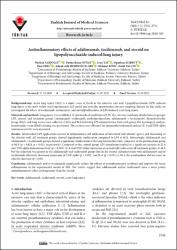Antiinflammatory effects of adalimumab, tocilizumab, and steroid on lipopolysaccharide-induced lung injury

Göster/
Erişim
info:eu-repo/semantics/openAccessAttribution 3.0 United Stateshttp://creativecommons.org/licenses/by/3.0/us/Tarih
2021Yazar
Sarıoğlu, NurhanSunay, Fatma Bahar
Yay, Arzu Hanım
Korkut, Oğuzhan
Erel, Fuat
Hişmioğulları, Adnan Adil
Köse, Mehmet
Yalçın, Betül
Üst veri
Tüm öğe kaydını gösterÖzet
Background/aim: Acute lung injury (ALI) is a major cause of death in the intensive care unit. Lipopolysaccharide (LPS) induced
lung injury is the most widely used experimental ALI model and provides opportunities for new targeting therapy. In this study, we
investigated the effects of tocilizumab, adalimumab, and methylprednisolone in LPS-induced acute lung injury.
Materials and methods: Lung injury was established by intratracheal instillation of LPS. The rats were randomly divided into six groups:
LPS, control, and treatment groups (adalimumab, tocilizumab, methylprednisolone, adalimumab + tocilizumab). Bronchoalveolar
lavage (BAL) and lung tissues were collected at 48 h and 96 h following LPS administration from each group. For histological analysis,
hematoxylin–eosin (H&E) staining was performed. The sections were obtained for immunohistochemical analysis. IL-6 and TNF-alpha
immunoreactivity were measured.
Results: Intratracheal LPS application resulted in inflammatory cell infiltration of interstitial and alveolar spaces and thickening of
the alveolar wall. All treatment groups showed significantly amelioration compared to LPS at 48 h. Interestingly, adalimumab and
adalimumab + tocilizumab groups showed a significant amelioration of the lung histoarchitecture, compared to the prednisolone group
at 96 h (p = 0.028, p = 0.025, respectively). Compared to the control group, LPS stimulation resulted in a significant increase in IL-6
and TNF-alpha immunoreactivity (p < 0.001). IL-6 and TNF-alpha expression were markedly reduced in all treatment groups at 48 h
but the reduction was greater in the adalimumab and tocilizumab group than in the steroid. Administration with adalimumab and/or
tocilizumab effectively decreased expression of TNF-alpha (p = 0.001) and IL-6 (p < 0.001) at 96 h, but prednisolone did not exert an
effective decrease (p > 0.05).
Conclusion: Adalimumab and/or tocilizumab significantly reduce the release of proinflammatory cytokines and improve the tissue
inflammation in the experimental model of ALI. Our results suggest that adalimumab and/or tocilizumab have a more potent
antiinflammatory effect on lung injury than the steroid.


















